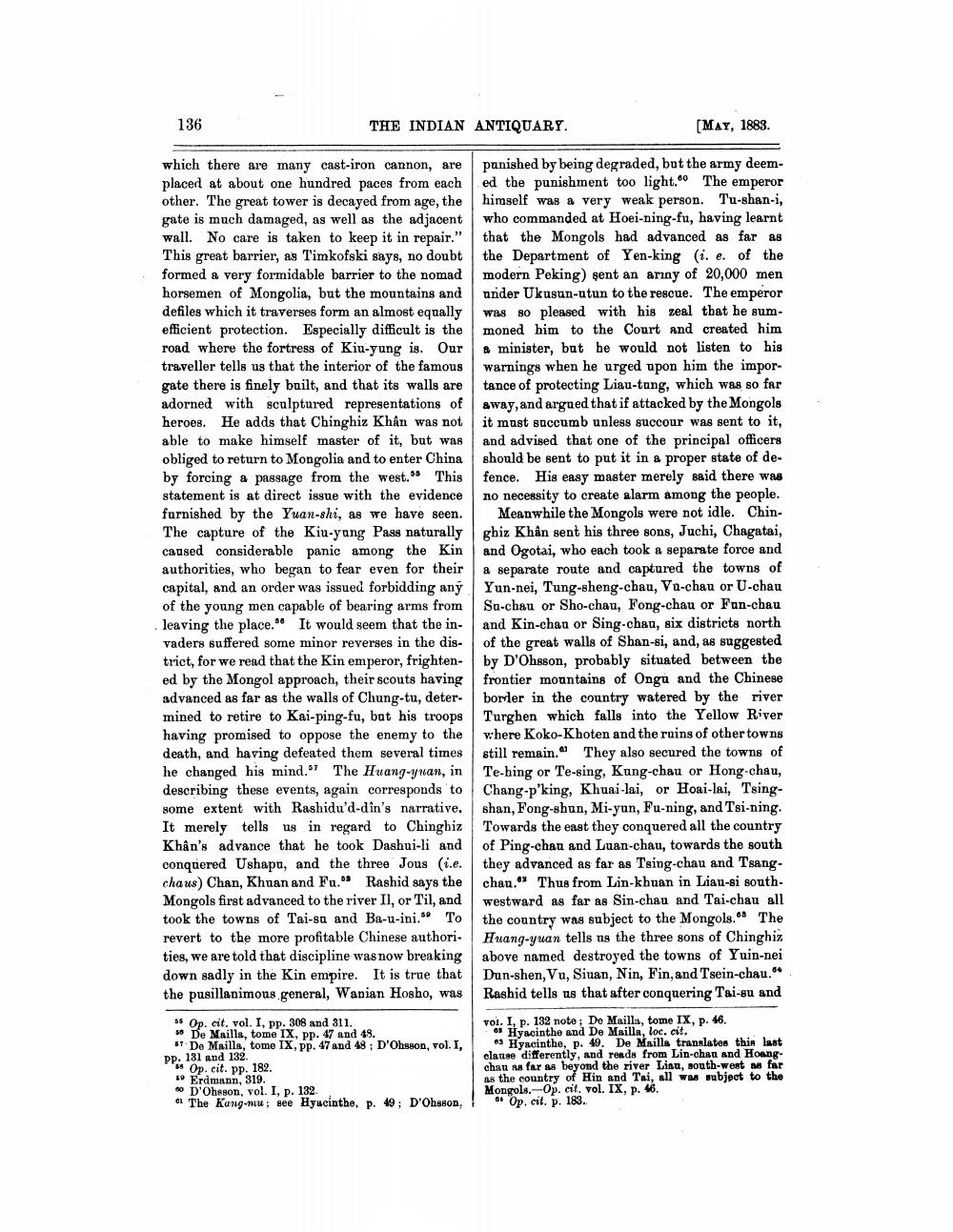________________
136
THE INDIAN ANTIQUARY.
which there are many cast-iron cannon, are placed at about one hundred paces from each other. The great tower is decayed from age, the gate is much damaged, as well as the adjacent wall. No care is taken to keep it in repair." This great barrier, as Timkofski says, no doubt formed a very formidable barrier to the nomad horsemen of Mongolia, but the mountains and defiles which it traverses form an almost equally efficient protection. Especially difficult is the road where the fortress of Kiu-yung is. Our traveller tells us that the interior of the famous gate there is finely built, and that its walls are adorned with sculptured representations of heroes. He adds that Chinghiz Khân was not able to make himself master of it, but was obliged to return to Mongolia and to enter China by forcing a passage from the west. This statement is at direct issue with the evidence furnished by the Yuan-shi, as we have seen. The capture of the Kiu-yung Pass naturally caused considerable panic among the Kin authorities, who began to fear even for their capital, and an order was issued forbidding any of the young men capable of bearing arms from leaving the place. It would seem that the invaders suffered some minor reverses in the district, for we read that the Kin emperor, frightened by the Mongol approach, their scouts having advanced as far as the walls of Chung-tu, determined to retire to Kai-ping-fu, but his troops having promised to oppose the enemy to the death, and having defeated them several times he changed his mind." The Huang-yuan, in describing these events, again corresponds to some extent with Rashidu'd-din's narrative. It merely tells us in regard to Chinghiz Khân's advance that he took Dashui-li and conquered Ushapu, and the three Jous (i.e. chaus) Chan, Khuan and Fu." Rashid says the Mongols first advanced to the river Il, or Til, and took the towns of Tai-sa and Ba-u-ini. To revert to the more profitable Chinese authorities, we are told that discipline was now breaking down sadly in the Kin empire. It is true that the pusillanimous general, Wanian Hosho, was
ss Op. cit. vol. I, pp. 308 and 311. se De Mailla, tome IX, pp. 47 and 48.
57 De Mailla, tome IX, pp. 47 and 48: D'Ohsson, vol. I, pp. 131 and 132.
5 Op. cit. pp. 182.
so Erdmann, 319.
[MAY, 1883.
60
punished by being degraded, but the army deemed the punishment too light. The emperor himself was a very weak person. Tu-shan-i, who commanded at Hoei-ning-fu, having learnt that the Mongols had advanced as far as the Department of Yen-king (i. e. of the modern Peking) sent an ariny of 20,000 men under Ukusun-utun to the rescue. The emperor was so pleased with his zeal that he summoned him to the Court and created him a minister, but he would not listen to his warnings when he urged upon him the importance of protecting Liau-tung, which was so far away, and argued that if attacked by the Mongols it must succumb unless succour was sent to it, and advised that one of the principal officers should be sent to put it in a proper state of defence. His easy master merely said there was no necessity to create alarm among the people.
Meanwhile the Mongols were not idle. Chinghiz Khân sent his three sons, Juchi, Chagatai, and Ogotai, who each took a separate force and a separate route and captured the towns of Yun-nei, Tung-sheng-chau, Va-chan or U-chau Su-chau or Sho-chau, Fong-chau or Fun-chau and Kin-chau or Sing-chau, six districts north of the great walls of Shan-si, and, as suggested by D'Ohsson, probably situated between the frontier mountains of Ongu and the Chinese border in the country watered by the river Turghen which falls into the Yellow River where Koko-Khoten and the ruins of other towns still remain. They also secured the towns of Te-hing or Te-sing, Kung-chau or Hong-chau, Chang-p'king, Khuai-lai, or Hoai-lai, Tsingshan, Fong-shun, Mi-yun, Fu-ning, and Tsi-ning. Towards the east they conquered all the country of Ping-chan and Luan-chau, towards the south they advanced as far as Tsing-chau and Tsangchau." Thus from Lin-khuan in Liau-si southwestward as far as Sin-chau and Tai-chau all the country was subject to the Mongols. The Huang-yuan tells us the three sons of Chinghiz above named destroyed the towns of Yuin-nei Dun-shen, Vu, Siuan, Nin, Fin, and Tsein-chau."* Rashid tells us that after conquering Tai-su and
so D'Ohsson, vol. I, p. 132.
The Kang-mu; see Hyacinthe, p. 49; D'Ohsson,
vol. I, p. 132 note; De Mailla, tome IX, p. 46. es Hyacinthe and De Mailla, loc. cit.
63 Hyacinthe, p. 49. De Mailla translates this last clause differently, and reads from Lin-chau and Hoangchau as far as beyond the river Linu, south-west as far as the country of Hin and Tai, all was subject to the Mongols. Op. cit. vol. IX, p. 46.
Op. cit. p. 183..




